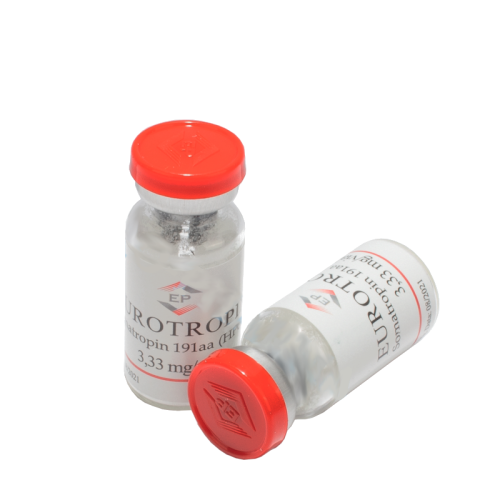Eurotropin HGH 100IU
- Brand: Euro-Pharmacies - US
- Product Code: Eurotropin HGH 100IU
- Availability: In Stock
-
$390.00
ACTIVE HALF-LIFE
2.5-3 hours
CLASSIFICATION
Peptide Hormone
DOSAGE
Men 4-10 IU/day
ACNE
No
WATER RETENTION
No
HBR
No
HEPATOTOXICITY
No
AROMATIZATION
No
MANUFACTURER
Euro-Pharmacies - US
LAB TEST
See Document
WAREHOUSE
USA Warehouse 3
SUBSTANCE
Somatropine - 191 Amino Acid
,
Human Growth Hormone (HGH), commonly referred to as somatotropin or somatropin, is a peptide hormone that promotes growth, cell reproduction, and regeneration in humans and other animals. As a specific type of mitogen, it targets particular cell types. HGH is a polypeptide composed of 191 amino acids, produced, stored, and released by somatotropic cells found in the lateral wings of the anterior pituitary gland. Its release is influenced by various factors, including nutrition and physical activity.
HGH encourages body cells to grow larger and to divide more rapidly than under normal circumstances. Additionally, it facilitates the transport of amino acids across cell membranes and enhances the conversion of these molecules into proteins. This contributes to an anabolic effect, promoting muscle growth in the body. HGH also affects carbohydrate usage, leading cells to decrease their normal carbohydrate consumption while increasing their utilization of fats. Research indicates that fat reduction and increases in lean mass can occur with as little as 0.028 iu/kg daily over a period of 24 weeks. Furthermore, it stimulates the production of IGF-1.
In medical applications, HGH is utilized to address growth disorders in children and hormone deficiencies in adults. Research consistently shows several positive effects associated with regulating HGH levels, including:
Several studies, particularly among those with HGH deficiencies, point to its vital role in mental and emotional health, as well as in maintaining high energy levels. Individuals with a deficiency often experience higher rates of depression compared to those with normal levels.
Research has also explored HGH's impact on cognitive functions such as learning and memory, suggesting that it may enhance cognitive abilities and aid in treating cognitive impairments linked to HGH deficiency.
In the context of competitive sports, HGH has been misused since at least 1982. It can lead to significant gains in weight and muscle mass, although it is less effective for improving strength. Athletes in the '70s and '80s showcased more defined muscle structures akin to classical sculptures, suggesting that they may not have increased their cardio routines or adopted higher protein diets.
HGH tends to yield better results when combined with a steroid cycle rather than used alone, making it particularly suitable for cutting cycles aimed at achieving lean muscle while burning fat.

